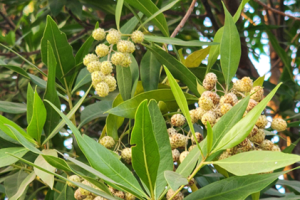TAG: GS 3: ECOLOGY AND ENVIRONMENT
THE CONTEXT: The Gujarat Forest department’s recent ban on Conocarpus trees, initially introduced as ornamental and avenue trees, has unveiled the environmental and health hazards associated with this exotic species.
EXPLANATION:
- We will see the reasons behind the ban, the ecological implications of Conocarpus, and the response from experts and authorities.
Environmental and Health Hazards of Conocarpus
- Gujarat’s forest department imposed a comprehensive ban on Conocarpus in both forest and non-forest areas, including nurseries and plantations.
- The ban was officially declared through a circular issued on September 26, 2023, highlighting the detrimental impact on the environment, infrastructure, and human health.
- The circular emphasizes the adverse effects of Conocarpus roots on telecommunication cables, drains, and freshwater pipelines, posing a risk to infrastructure.
- Ecologists welcome the ban, pointing out the lack of resourcefulness for native insects, birds, and animals due to Conocarpus proliferation.
Health Concerns
- Respiratory Issues: Reports indicate that Conocarpus pollen can cause respiratory illnesses, colds, coughs, asthma, and allergies, particularly during winter.
- Human Health Priority: The ban addresses the need to safeguard human health, especially in the context of the recent global health crisis.
Evolution of Conocarpus in India
- Initially introduced as ornamental and avenue trees, Conocarpus species gained popularity for their fast growth rate and adaptability to harsh conditions.
- Massive plantation drives led to the widespread presence of Conocarpus, notably in significant projects like the Smritivan memorial in Bhuj and the ‘Mission Million Trees’ drive in Vadodara.
- Native vs. Exotic: Conocarpus, native to Africa, raised concerns about its impact on the existing food web and ecosystem values for native species.
- Exotic Species vs. Indigenous Diversity: Experts highlight the disturbance caused by Conocarpus to the local ecosystem, advocating for the prioritization of native plant species that support local biodiversity.
Insights from Experts and Authorities
- Wildlife Researchers has emphasized the lack of ecological significance in Conocarpus, describing it as a “green desert” with no added value to the ecosystem.
- Botanists warns about the danger of exotic trees like Conocarpus to human health, especially in the context of respiratory illnesses.
- The implementation of the ban, focusing on cutting down existing Conocarpus plantations within forest premises has been confirmend.
Future Implications and Sustainable Practices
- Awareness Initiatives: The circular includes instructions for conducting awareness camps and nature educational programs to inform citizens about the environmental and health impacts of Conocarpus.
- Government’s Commitment: The ban reflects the government’s commitment to preserving indigenous trees and discouraging the dominance of foreign species.
- Developer’s Perspective: Eco-development consultant notes a growing discouragement of Conocarpus plantations, emphasizing the irreplaceable role of native trees in ecosystems.
- Call for Sustainable Practices: Experts stress the importance of prioritizing native species that provide ecological benefits, support local biodiversity, and do not pose health risks.
Conocarpus tree:
- It is a flowering plant belonging to the family of Combretaceae.
- It is an invasive mangrove species.
- Trees of this species flower in winter and spread pollen in nearby areas.
- It has been used by various public authorities in India as landscaping for road medians, along roads, and in public gardens.
- Countries in the Arabian Peninsula have used the plant to block sand from desert storms and to control pollution.
- This tree is famous for its dark green leaves color throughout the year and withstands harsh environmental conditions such as high and low temperatures.
- It is very adaptive and could grow even in areas with extreme salinity.
- It absorbs more water from soil than other species and is a threat to groundwater.

Conclusion
- In conclusion, Gujarat’s ban on Conocarpus trees marks a crucial step in addressing the environmental and health challenges posed by exotic species.
- The analysis underscores the need for a shift towards sustainable plantation practices, prioritizing native trees, and creating awareness about the ecological and health implications of introduced species.
- The ban sets a precedent for other regions to reevaluate their choices in greening projects, promoting biodiversity, and ensuring a healthier environment for future generations.




